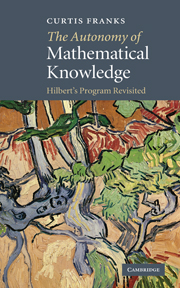3 - Arithmetization
Published online by Cambridge University Press: 07 January 2010
Summary
INTRODUCTION
Hilbert's program laid the groundwork for a demonstration of the autonomy of mathematics. We have stressed that this set-up itself is of philosophical significance, for the approach Hilbert articulated uncovers a precise response to long-standing epistemological questions about justification. Precisely, Hilbert's innovative stance was this: Mathematics is a way of knowing that cannot and need not be justified on any a priori grounds. As such, it is not properly the target of skeptical attacks, which in essence demand such grounds. Nevertheless mathematics can be the subject of foundational insight, through a self-evaluation the outcome of which is that questions about how and why mathematical techniques work the way they do can be given purely mathematical answers. Thus in his numerous remarks in the vein of the following passage, Hilbert speaks of a type of “security” that cuts deeper than mere claims to knowledge:
Just as the physicist investigates his apparatus and the astronomer investigates his location; just as the philosopher practices the critique of reason; so, in my opinion, the mathematician has to secure his theorems by a critique of his proofs, and for this he needs proof theory.
(Hilbert [1922], p. 208)The “security” to be established by proof-theoretical critique is not assurance that mathematical techniques are reliable. It is a secondlevel claim about the nature of their reliability. Hilbert wants to demonstrate that their reliability is self-witnessing and not founded on any non-mathematical base.
- Type
- Chapter
- Information
- The Autonomy of Mathematical KnowledgeHilbert's Program Revisited, pp. 61 - 104Publisher: Cambridge University PressPrint publication year: 2009

